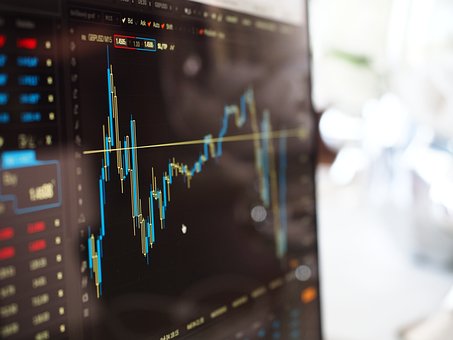
Stock market news live updates
Wall Street stocks ended mixed on Friday, with battered technology shares recovering some declines amid encouraging data, though fears of rising interest rates caused investors to take fright.
The Nasdaq traded 0.6% higher, paring losses at the end of the week. However, the index still posted a weekly loss of 4.9% for its worst since October as tech stocks unwound some of their steep 2020 gains this week, as benchmark Treasury yields spiked to their highest levels since January 2020. The rise in rates are tied to a range of corporate and consumer borrowing costs, and may undermine the recovery if they jump too quickly.
The S&P 500 ended about 0.5% lower while the Dow shed 475 points, or 1.5%, at the end of Friday's session. The indexes posted gains of 2.6% and 3.2% for February, thanks to a rally earlier in the month. The Nasdaq's monthly gain was just under 1%.
On Friday, the U.S. House of Representatives is anticipated to pass a $1.9 trillion COVID-19 stimulus package, which would include measures in President Joe Biden's original proposal like $1,400 direct checks to most Americans, $400 per week in augmented federal unemployment insurance and $350 billion in state, local and tribal government relief. The bill would then head to the U.S. Senate, with many lawmakers aiming to pass the bill before a mid-March cliff for when current pandemic-era benefits are set to expire.
Meanwhile, shares of Airbnb (ABNB) rose more than 10% after the company reported better-than-expected sales in the fourth quarter, despite ongoing pressure to the travel industry because of the coronavirus pandemic. But shares of DoorDash (DASH), another newly public company that debuted earnings results after market close, sank more than 3%, after the food delivery company posted widening net losses and said the outlook this year was "highly uncertain" as in-person restaurants begin to reopen.

A rapid rise in Treasury yields this week has deterred investors from risk assets, as the specter of rising borrowing costs for companies and a jump in inflationary pressures mounted. The yield on the benchmark 10-year note jumped to a fresh one-year high of as much as 1.6% on Thursday before cutting some gains.
Yields were mostly lower across the curve Friday morning, but held near one-year highs as data showed consumers opened up their wallets in a big way last month.
"Driving rates higher has been a combination of higher growth expectations as well as higher inflation expectations. Until recently, market participants have been able to digest the upward drift in long-term rates, but it appears that the next leg up in interest rates is a bigger bite to chew," Charlie Ripley, senior investment strategist for Allianz Investment Management, told Yahoo Finance in an email. "Looking at where real yields were at, they were simply too low when considering growth expectations, and it’s likely that long-term real yields will continue to drift higher as economic data improves."
Other strategists echoed this sentiment, and noted that markets' fears over a higher-rate environment may be overblown.
"Don’t fear rising rates. The last 16 rising rate environments, the markets rallied in 13 of those environments,” Eric Diton, managing director of The Wealth Alliance, told Yahoo Finance. “So rising rates are simply reflecting the fact that the economy is recovering, vaccinations are working. This is good news. And quite frankly half a percent on a 10-year Treasury was ridiculous, it was a joke. And 1.5% is much more realistic.”
—
4:03 p.m. ET: Stocks end mixed, Nasdaq posts worst weekly loss since October
Here's where the three major indexes closed out Friday's session:
-
S&P 500 (^GSPC): 3,810.87, -18.47 (-0.48%)
-
Dow (^DJI): 30,927.76, -474.25 (-1.51%)
-
Nasdaq (^IXIC): 13,192.34, +72.91 (+0.56%)

3:35 p.m. ET: SEC suspends trading in additional companies over social media concerns
The U.S. Securities and Exchange Commission further expanded the list of stocks temporarily suspended from trading due to "questionable trading and social media activity," according to a statement from the commission.
The securities affected by the new order are of Bebida Beverage Co. (BBDA), Blue Sphere Corporation (BLSP), Ehouse Global Inc. (EHOS), Eventure Interactive Inc. (EVTI), Eyes on the Go Inc. (AXCG), Green Energy Enterprises Inc. (GYOG), Helix Wind Corp. (HLXW), International Power Group Ltd. (IPWG), Marani Brands Inc. (MRIB), MediaTechnics Corp. (MEDT), Net Talk.com Inc. (NTLK), Patten Energy Solutions Group Inc. (PTTN), PTA Holdings Inc. (PTAH), Universal Apparel & Textile Company (DKGR) and Wisdom Homes of America Inc. (WOFA).
"Certain social media accounts may be engaged in a coordinated attempt to artificially influence their share prices," according to the SEC.
—
2:26 p.m. ET: Robinhood says it is discussing outages, options trading with FINRA
Popular online brokerage firm Robinhood disclosed in a filing Friday that the company is in talks with the Financial Industry Regulatory Authority (FINRA) over outages on the platform during the March 2020 market volatility, along with other matters surrounding options trading and communications with customers on the platform.
"While these discussions are ongoing, RHF [Robinhood Financial] and RHS [Robinhood Securities] anticipate that any resolution, if reached, would involve charges of violations of FINRA rules, a fine, customer restitution, a censure, and a compliance consultant," according to the filing. "We have accrued in our statement of financial condition for the year ended December 31, 2020 of $26.6 million representing the bottom of the range of our probable losses."

11:56 a.m. ET: Stocks trade mixed as Nasdaq pushes higher by 1%
Here's where markets were trading just before noon in New York:
-
S&P 500 (^GSPC): 3,836.81, +7.47 (+0.2%)
-
Dow (^DJI): 31,149.07, -252.94 (-0.81%)
-
Nasdaq (^IXIC): 13,274.98, +156.52 (+1.19%)
-
Crude (CL=F): $62.56 per barrel, -$0.97 (-1.53%)
-
Gold (GC=F): $1,722.10 per ounce, -$53.30 (-3.00%)
-
10-year Treasury (^TNX): -1.7 bps to yield 1.498%
—
10:50 a.m. ET: January spending spree "almost certainly tied" to stimulus
JPMorgan Chase economist Daniel Silver thinks January's consumer data "was almost certainly tied to the surge in income coming from federal support during the month." In a research note, Silver breaks down how the extra cash — despite the fight over whether it should have been bigger — was a boon for cash-strapped consumers:
Among the transfer receipts, stimulus checks accounted for about $1.7tr of income in January and the supplement to UI payments authorized as part of the December stimulus package accounted for about $300bn (both of these figures reported in annualized terms). Even though spending jumped in January, the saving rate increased from 13.4% in December to 20.5% on this massive influx of income.
—
10:10 a.m. ET: Stocks give up gains as yields take center stage
Wall Street has now swung to the red, with traders taking fright from the run-up in bond yields that's fighting the Fed's policy. All three major indexes are now under water

9:30 a.m. ET: Stocks mixed, Nasdaq tries for rebound
Here were the main moves in markets as of 9:30 p.m. ET:
-
S&P 500 (^GSPC): 3,853.23, +23.89 (+0.62%)
-
Dow (^DJI): 31,336.57, -65.44 (-0.21%)
-
Nasdaq (^IXIC): 13,285.37, +165.94 (+1.26%)
-
Crude (CL=F): $62.60 per barrel, -0.93(-1.46%)
-
Gold (GC=F): $1,756.20 per ounce, -19.20(-1.08%)
-
10-year Treasury (^TNX): -14 bps to yield 1.472%
—
8:30 a.m. ET: Consumers spend, spend, spend in January
Cash-strapped no more? Consumers opened up their wallets in a big way last month as stimulus checks began rolling in, which sent household income skyrocketing by 10% and spending up 2.4%, data showed on Friday. It puts the U.S. economy on a solid footing for Q1 growth, but is likely to fuel a debate over whether soaring demand will (eventually) stoke inflationary pressures.
—
7:14 a.m. ET Friday: Stock futures fall, Nasdaq paces toward weekly loss of 5%
Here's where markets were trading ahead of the opening bell Friday morning:
-
S&P 500 futures (ES=F): 3,821.00, down 7 points or 0.18%
-
Dow futures (YM=F): 31,256.00, down 115 points or 0.37%
-
Nasdaq futures (NQ=F): 12,785.5, down 46.25 points or 0.36%
-
Crude (CL=F): -$1.31 (-2.06%) to $62.22 a barrel
-
Gold (GC=F): -$17.10 (-0.96%) to $1,758.30 per ounce
-
10-year Treasury (^TNX): -4.7 bps to yield 1.468%
—
6:25 p.m. ET Thursday: Stock futures trade flat to slightly lower
Here's where markets were trading as the overnight session began:
- S&P 500 futures (ES=F): 3,823.00, down 5 points or 0.13%
-
Dow futures (YM=F): 31,345.00, down 26 points or 0.08%
-
Nasdaq futures (NQ=F): 12,812.25, down 19.5 points or 0.15%
© 2021 LeackStat.com
